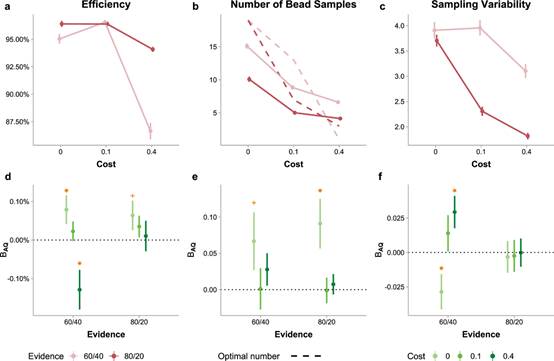On December 2, 2019, the research work “Autistic traits influence the strategic diversity of information sampling: Insights from two-stage decision models” of the collaboration between Zhang Hang's group and Yi Li's group at Peking University was published online in PLOS Computational Biology. The study found that autism traits affect the strategies people use to collect information, which in turn affects the efficiency of decision-making.
Information can reduce uncertainty in decision-making process, but gathering information usually incurs a cost, which could be time, physical strength, or money. Therefore, in order to maximize the chance of survival or more economic benefits, both humans and animals need to balance the losses and gains in the process of information sampling.
However, autism spectrum disorder (ASD) — a neurodevelopmental disorder characterized by social impairments and repetitive behaviors — seem to be accompanied by suboptimal information sampling, though in various guises. For example, individuals with repetitive behaviors tend to spend time on redundant information that helps little to reduce uncertainty (Palmer, Lawson, & Hohwy, 2017). The study hypothesized suboptimal information sampling is a general feature of people with autism or high autistic traits and attempted to investigate who cognitive processes may be affected.
The research team tested healthy adults of different levels of autistic traits in an information sampling task adapted from: On each trial of the experiment, participants could draw samples sequentially to accumulate evidence for probabilistic inference and would receive monetary rewards for correct inferences (Figure 1). Each additional sample may increase their probability of correct inference but also incur a fixed monetary cost. In order to maximize expected gain, participants should draw fewer samples when each sample had a higher cost or provided higher evidence, and vice versa. The study manipulated the cost and evidence per sample and compared participants’ performance to optimality.

Figure 1. Schematic of the experimental process.
It was found that compared to their peers, participants with higher level of autistic traits received higher rewards in the zero-cost conditions due to less undersampling, where the optimal strategy was to sample as many as possible, but meanwhile lower rewards in the high-cost, low-evidence condition due to more oversampling (Figure 2abde), where the optimal strategy would sacrifice accuracy to save cost.

Figure 2. Participants' behavioral performance and the impact of autistic traits on different behavioral variables. The left column: the efficiency of the sampling decision to get rewards; the middle column: the number of beads drawn; the right column: the variability of the number of samples between trials.
Through computational modeling, the study further decomposed participants’ sampling choices into multiple sub-processes and found that the influence of autistic traits was surprisingly selective and subtle. In particular, participants’ sampling choices could be well described by a two-stage decision process: When the first decision stage does not reach the choice of stopping sampling, a second decision stage is probabilistically involved to arbitrate, which offers a second chance to consider stopping sampling. The two stages were independently controlled by cost and evidence and neither stage showed autistic-trait-related differences. What varied with levels of autistic traits was the strategic diversity: Participants with higher autistic traits were more likely to always consider cost in the first stage and evidence in the second, while those with lower autistic traits had a larger chance to use the reverse order as well. As a consequence, the former would perform better when the optimal strategy does not depend on evidence, while the latter would do better when the optimal strategy is determined jointly by cost and evidence. This study uses autistic traits as a medium to provide insights into the behaviors associated with core symptoms that are reflected in inferences for autism.
Lu H, Yi L, Zhang H (2019) Autistic traits influence the strategic diversity of information sampling: Insights from two-stage decision models. PLoS Comput Biol 15(12): e1006964. https://doi.org/10.1371/journal.pcbi.1006964
Haoyang Lu, a fourth-year doctoral student at the Peking University Center for Life Sciences, is the first author of the paper. Dr. Yi Li and Dr. Hang Zhang are co-corresponding authors. Hang Zhang was supported by the National Natural Science Foundation of China (http://www.nsfc.gov.cn/) grants 31571117 and 31871101 and by funding from Peking-Tsinghua Center for Life Sciences (http://cls.pku.edu.cn/). Li Yi was supported by the National Natural Science Foundation of China grants 31571135 and 31871116, Beijing Municipal Science & Technology Commission grant Z171100000117015, and Medicine + X Project at Peking University grant PKU2017LCX03. The funders had no role in study design, data collection and analysis, decision to publish, or preparation of the manuscript.


